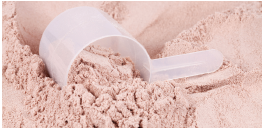This randomized study compared the effects of an early enteral formula containing whey protein to a standard enteral formula containing casein on the levels of glutathione and inflammatory markers in aged patients with acute ischemic stroke. Thirty-one elderly patients (12 males and 19 females; median age 74 years) with ischemic stroke were randomized to receive early nasogastric feeding (35 kcal/kg/day and 1.2 g of protein/kg/day) with either a formula containing hydrolyzed casein or another isocaloric and isonitrogenous formula containing hydrolyzed whey protein for five days. Mortality was found to be similar between groups and was associated with higher serum IL-6 (p = 0.04) and C-reactive protein (p = 0.02) levels. Serum IL-6 decreased (p = 0.02) and glutathione increased (p = 0.03) only in the whey protein group. In addition, serum IL-6 was lower (p = 0.03) and glutathione was higher (p = 0.03) in the whey protein group compared to the casein group. The authors concluded that an early-administered whey protein formula seems to be more effective than a casein formula at decreasing inflammation and increasing antioxidant defenses in elderly patients with ischemic stroke. Nutrition. 2011 Apr;27(4):440-4. PMID: 21167685
Home Research News Whey protein may decrease inflammation and increase antioxidant defenses in elderly patients...







